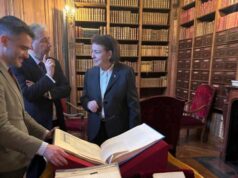The ecumenical dynamism of the Hellenic glossological phenomenon is not a philological paradox or archaeognostic phantasy, but a pragmatic fact based on historical exelixis.
The Hellenic glossa is the authentic etymological archetype and central organ in the genesis of European logos, the basic architect of its lexis, as well as its alphabet, phonetics, syntax, grammar, semiology and semantics, even in idioms and dialects.
The lexicon and encyclopedia of Europe are a Hellenic palimpseston. Hellenic influence on Western idiomorphy has been not just energetic and plethoric, but catholic and catalytic.
The Hellenic glossa and noesis have offered the gnoseological and epistemological system, including onomastics and technical phraseology, methodology and criteria, prototypes, analogs and parallels, as the basis for the organization of ideas, hypotheses and theories leading to diagnosis, characterization, categorization, and hermeneutics.
The Hellenic paradigm is everywhere in the cosmos of philosophy, episteme, and techne, technology and anthropology, economy and ecology.
From Hesiodic theogony and cosmogonic mythology on chaos and taxis, to Homeric epic poetry about the epoch of heroes;
From Pindaric lyrical elegies to Sophoclean and Aristophanic theatrical dramas and comedies;
From Herodotean and Thucydidean historiography to Demosthenic rhetoric and logography;
From Socratic maieutic dialogue and ideas on arete, ethos, aristeia and paideia, to Platonic ontology and philosophy on gnosis, psyche and politeia, as well as Aristotelean logic and analytical skepsis in physics and metaphysics;
From Euclidean and Archimedean geometry, Pythagorean theorems and axioms on mathematics and music, to the mechanics of Heron of Alexandria.
Also, from the aesthetics and symbolisms of the plastic and iconistic technae in pursuit of harmony and symmetry, as part of the holistic idea of kallos, to the icon of ‘kalos kagathos’ in the syllogism about the polis and politics, that led from aristocracy and tyranny to the theory and praxis of Periclean democracy;
Αnd later on, from the strategic pragmatism of the Macedonian dynastic monarchy, to Alexander’s Ecumene, and from the Hellenistic basileia to Roman autocracy.
Finally, from the Hellenization of the Christian kerygma by the Evangelists and Paul in his homilies and epistles, to the crystallization of the dogma in patristic theology.












